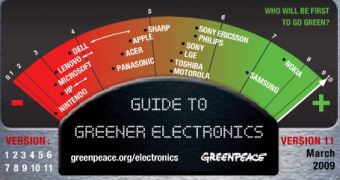In this 11th edition of the Guide to Greener Electronics, Greenpeace has penalized corporate IT vendors for failing to commit to eliminating PVC (polyvinyl chloride) and brominated flame retardants (BFRs) from their products by the end of this year. Apple climbed four spots on the ranking (now on tenth place) for successfully making all products PVC and BFR-free.
“The Guide to Greener Electronics, now in its 11th update, shows which electronics companies are investing to meet their commitments to remove toxic substances from their products, tackle climate change, and introduce better recycling and take-back policies,” Greenpeace says. “When electronics companies pay for the collection (take-back) and recycling of their own products, they have the added incentive to develop cleaner, more recyclable products,” the organization explains.
Greenpeace trusts that “Apple can do it,” although it doesn't have certified PVC-free power cords yet. However, the Mac maker's products are now PVC and BFR-free in every other way, Greenpeace outlines. “If Apple can do it, then so should the other leading PC manufacturers,” reads a post on the organization's official web site. “We believe all electronics companies should have at least one toxic-free line of products on the market by the end of the year. Acer currently remains committed to phasing out PVC and BFRs in 2009 [...] HP, Lenovo and Dell still on the toxic stuff," says Greenpeace.
Nokia again topped the list of 17 companies included in the survey, scoring well for its initiative in a take-back program that collects used mobile phones at almost 5,000 collection points in 84 countries. The mobile phone manufacturer, though, could improve on its recycling rates, Greenpeace asserts. Despite the wide take-back network, Nokia's recycling rate is only as good as 5 percent, currently.
Rightfully earning the place of runner up was Samsung, with Sony Ericsson and Philips tying in for third place. Also tied for a spot were Sony and LG Electronics – fifth place. Nintendo still lags way back in the red zone being ranked with an embarrassing 0.8 points out of 10. The primary reason cited by Greenpeace is not the use of toxic chemicals, but rather the fact that Nintendo doesn't disclose much of the information that the organization requests to properly rank the Japanese maker of video games consoles.

 14 DAY TRIAL //
14 DAY TRIAL //